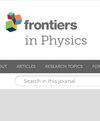Evolution of nanohillocks by fullerene ion-induced localized plasma
IF 1.9
3区 物理与天体物理
Q2 PHYSICS, MULTIDISCIPLINARY
引用次数: 0
Abstract
Surface nanostructures etch without chemicals; owing to this, their development is a crucial technical process. Surface nanohillocks may be created by irradiating yttrium iron garnet (YIG) with 30-MeV C60 cluster ions. The nanohillock creation mechanism is disputed. In this study, we propose that the formation mechanism is a plasma collective effect of charged particles that depends on localized rogue waves. Rogue waves will explain YIG surface nanohillock creation using a traditional hydrodynamic plasma model. Analytically solving hydrodynamic ion fluid equations and Maxwellian electron distributions yields a non-linear Schrödinger equation. Solving the latter gives us plausible rogue wave domains. Rogue waves concentrate charged ions from the surroundings into a small, confined zone, generating surface nanohillocks. The relevance of different plasma parameters is highlighted in the rogue wave profile.富勒烯离子诱导局部等离子体形成的纳米柱状结构
表面纳米结构的蚀刻不需要化学品;因此,其开发是一个关键的技术过程。用 30-MeV C60 簇离子辐照钇铁石榴石(YIG)可产生表面纳米休克。纳米休克的产生机制尚存争议。在本研究中,我们提出其形成机制是等离子体带电粒子的集体效应,取决于局部流氓波。流氓波将利用传统的流体动力等离子体模型解释 YIG 表面纳米休克的形成。对流体力学离子流体方程和麦克斯韦电子分布进行分析求解,可以得到一个非线性薛定谔方程。求解后者可以得到可信的流氓波域。流氓波将周围环境中的带电离子集中到一个狭小的封闭区域,从而产生表面纳米丘。不同等离子体参数的相关性在流氓波剖面中得到了强调。
本文章由计算机程序翻译,如有差异,请以英文原文为准。
求助全文
约1分钟内获得全文
求助全文
来源期刊

Frontiers in Physics
Mathematics-Mathematical Physics
CiteScore
4.50
自引率
6.50%
发文量
1215
审稿时长
12 weeks
期刊介绍:
Frontiers in Physics publishes rigorously peer-reviewed research across the entire field, from experimental, to computational and theoretical physics. This multidisciplinary open-access journal is at the forefront of disseminating and communicating scientific knowledge and impactful discoveries to researchers, academics, engineers and the public worldwide.
 求助内容:
求助内容: 应助结果提醒方式:
应助结果提醒方式:


